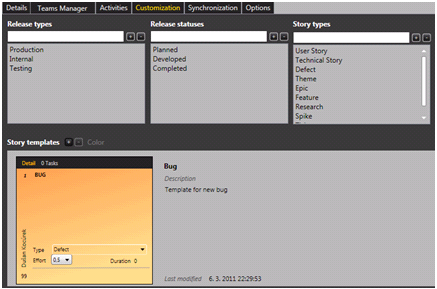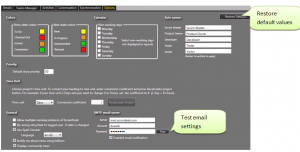Scrum is a framework typically adopted by every company. ScrumDesk allows customizing it according to needs.
Customization
- Release types allows defining how important is the release and where will be deployed
- Release statuses. Companies track the status of the releases, therefore, they need to define statuses to be used.
- Story types. A story in Scrum is used to describe different artifacts from feature requests to defects.
- Story templates simplify backlog management. The team can predefine templates that can be used to create new stories with some attributes predefined already. The template can be named and described. The color of selected template can be chosen by click on Color link.

Options page
- Colors section enables to change default colors of stories and retrospective ideas statuses. This setting is project specific.
- Default priority – the setting used when a new story is created. Some teams prefer to have all new stories with the priority 1, some with the highest priority so product owner can check them.
- Working calendar – charts are not calculated for non-working days. These days depend on regional settings but must be set manually as teams can be distributed in different countries.
- Roles names – not every ScrumDesk user works in an IT area. Non-IT areas use different terminology that can be configured here.
- Time unit – all time fields are tracked using the time unit chosen in this field. Changing the value of this field will recalculate all the backlog and progress of all items to a new time unit. The user has to configure ratio between units before the conversion.
- Allow multiple instances – ScrumDesk runs as one instance even user start it more times. If you would like to have more instances running with different projects displayed, check this check box to allow that.
- Re-assign story to logged user – if the story is changed, it is automatically re-assigned to the team member who changed an entity. If you would like to keep the original assignee, check this option and item will be not reassigned.
- Use spellchecker – details of stories and tasks are checked for type and grammar errors. Users are allowed to choose the language for spell checker and enable/disable it.
- Notify me about changes – the information about any change is sent to all team members that are informed about it in the small popup window. Changes are checked every 10 minutes, therefore, team is informed about them even teams are distributed.
- Display community news – we keep our customers updated via this page with more details about changes and agile events in the world.
- SMPT email server – to propagate changes via email as well, the email server must be configured. Click Test button to send a test email and validate settings. Email notification can be disabled.

